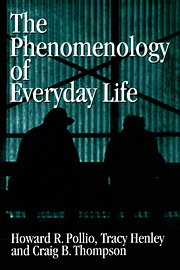Book contents
- Frontmatter
- Contents
- Preface
- PART I EXISTENTIAL PHENOMENOLOGY AND THE SCIENCE OF PSYCHOLOGY
- PART II GROUNDING THE WORLD OF EVERYDAY LIFE
- 3 The Body as Lived: Themes in the Human Experience of the Human Body
- 4 Time in Human Life
- 5 The Human Experience of Other People
- PART III SELECTED TOPICS FROM EVERYDAY LIFE
- PART IV THE PHENOMENOLOGY OF EVERYDAY LIFE
- References
- Name Index
- Subject Index
5 - The Human Experience of Other People
Published online by Cambridge University Press: 04 August 2010
- Frontmatter
- Contents
- Preface
- PART I EXISTENTIAL PHENOMENOLOGY AND THE SCIENCE OF PSYCHOLOGY
- PART II GROUNDING THE WORLD OF EVERYDAY LIFE
- 3 The Body as Lived: Themes in the Human Experience of the Human Body
- 4 Time in Human Life
- 5 The Human Experience of Other People
- PART III SELECTED TOPICS FROM EVERYDAY LIFE
- PART IV THE PHENOMENOLOGY OF EVERYDAY LIFE
- References
- Name Index
- Subject Index
Summary
For psychology, few questions are as fundamental as those of how we stand in relation to others of our kind. Independent of the type of psychology in which we engage, or the theoretical tradition we reflect, an account of how we experience other people needs to be given. The primacy of our experiences with other people was well noted by William James (1890) when he wrote:
We are not only gregarious animals, liking to be in sight of our fellows, but we have an innate propensity to get ourselves noticed, and noticed favorably, by our kind. No more fiendish punishment could be devised, were such a thing physically possible, than that one should be turned loose in a society and remain absolutely unnoticed by all the members thereof. If no one turned round when we entered, answered when we spoke, or minded what we did, but if every person we met “cut us dead”, and acted as if we were nonexisting things, a kind of rage and impotent despair would ere long well up in us, from which the cruellest bodily tortures would be relief.
(p. 201)From Allport to Zimbardo, each of social psychology's major practitioners may be viewed as attempting to deal with some aspect of other people and their effects on the individual. Attribution, attraction, and person perception are but a few of the subtopics emerging from social psychology to focus attention on specific aspects of this question.
The attempt to understand the experience and effects of the other on the self is not a question unique to social psychology.
- Type
- Chapter
- Information
- The Phenomenology of Everyday LifeEmpirical Investigations of Human Experience, pp. 124 - 154Publisher: Cambridge University PressPrint publication year: 1997



